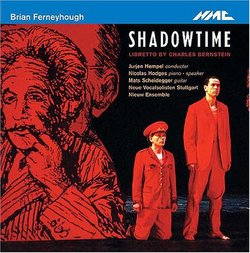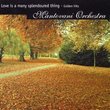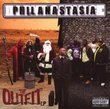| All Artists: Brian Ferneyhough, Jurjen Hempel, Andreas Fischer, Ekkehard Abele, Guillermo Anzorena, Matthias Horn, Tobias Schlierf, Mats Scheidegger, Barbara Stein, Christiane Schmeling Title: Brian Ferneyhough: Shadowtime Members Wishing: 1 Total Copies: 0 Label: Nmc Records Original Release Date: 1/1/2006 Re-Release Date: 4/25/2006 Album Type: Import Genre: Classical Style: Opera & Classical Vocal Number of Discs: 2 SwapaCD Credits: 2 UPCs: 675754905927, 5023363012324 |
Search - Brian Ferneyhough, Jurjen Hempel, Andreas Fischer :: Brian Ferneyhough: Shadowtime
 | Brian Ferneyhough, Jurjen Hempel, Andreas Fischer Brian Ferneyhough: Shadowtime Genre: Classical
|
Larger Image |
CD DetailsSimilar CDs
|
CD ReviewsFerneyhough's "thought opera" entertains and provokes R. Hutchinson | a world ruled by fossil fuels and fossil minds | 07/04/2007 (4 out of 5 stars) "It's been something like a year now that I've been listening to SHADOWTIME. Though the lyrics are virtually incomprehensible, and though, like most avant "operas" it is wildly over-ambitious, I find that it works on multiple levels, including low comedy, and I really enjoy listening to it. It seems to me that operas in general, whether avant or traditional, lose something essential when captured in audio only. Hence, of course, the trend toward placing them on DVD's instead. If SHADOWTIME ever makes it onto DVD, we can look forward to seeing the 2-headed Karl Marx/Groucho Marx dog Kerberus, which if I remember my Greek mythology, is the canine guardian of Hades -- among other visual delights!
Who was Walter Benjamin (1892-1940)? A sociological and cultural critic, born to a wealthy Jewish family, Benjamin represented in his writings a unique, one might say mystical, synthesis of Marxism and Jewish mysticism. Bertolt Brecht, Georg Lukacs and Gershom Scholem were friends of his, representing these two strands. His most famous work is probably the essay "The Work of Art in the Age of Mechanical Reproduction," and he was loosely affiliated with the Frankfurt School through Theodor Adorno. Benjamin was either killed or more likely committed suicide at the Spanish border while attempting to belatedly flee Nazi Germany. Ferneyhough explains that he selected Benjamin for the subject of his first and only opera because he was neither hero, like Orpheus, nor anti-hero, like Wozzeck, but something more complex. Says Ferneyhough, "The image of a coherent whole is no longer accessible to us, because mediators and power itself have reduced it to tiny fragments." SHADOWTIME is composed mainly of small fragments and short movements. Scene Three: "The Doctrine of Similarity" features beautiful vocals. Scene Five: "Pools of Darkness (11 Interrogations)" includes the 2-headed dog and other absurdities such as the Baal Shem Tov (the legendary leader of the Hasidim) disguised as a vampire!?! Einstein asks "What time is it now?" Given the dire subject matter -- the events leading to the death of Benjamin are the subject of Scene 1 of Seven Tableaux, and the rest of the opera follows his descent into the underworld through a portal that resembles a Las Vegas nightclub to confront the Angel of History -- Ferneyhough has written for the Nieuw Ensemble and the Neue Vocalsolisten Stuttgart with an incredibly light touch, both light in terms of texture, and light in terms of emotional tone. SHADOWTIME is more intellectual than emotional, but it does have an unmistakable streak of humor running through it, and though ultimately it is a tragedy, it maintains a tragicomic balance throughout. SHADOWTIME was recorded in July, 2005 at the London Coliseum, and had its U.S. premiere later that month at the Lincoln Center. (The world premiere was in Munich in May of 2004.) It was met, at least in the Anglo world, with a diffident response from the audience and the critics, and who could be surprised? There is not a single passionate aria to be found. Clearly this is a work for the intellectual set, and clearly you are "in that number" or you wouldn't be reading about Brian Ferneyhough recordings! Central to the drama is the Angelus Novus, the Angel of History, a concept which Benjamin deployed, based originally on a Paul Klee painting. In the better-known Durer painting, an angel flies, and as it looks back it sees the wreckage of history piling up behind it. The second tableaux of SHADOWTIME is called "The Rustling of the Wings of Gabriel," and features solo guitar and thirteen players. Gabriel is the angel of Messianic time. At the end of Benjamin's journey, he confronts the Angel of History in the Seventh Tableaux, "Stelae for Failed Time." One lyric is "I back away/helpless, my/eyes fixed./This is my task:/to imagine no wholes/from all that has been smashed." Benjamin desired a radical break from historical time into "now time" (jetztzeit) -- and who doesn't? -- but SHADOWTIME does not end with that realization, rather something more ambiguous. I'm afraid I have only scratched the surface, but a review can only contain so much. There is much more information in NMC's liner notes booklet, and the entire libretto, much of which is never actually heard in the opera, by American poet, editor and English professor Charles Bernstein, is available in its entirety as a book, from Green Integer Books. Among the factors that propelled me finally to write a review of SHADOWTIME was my visit over Memorial Day weekend to the U.S. Holocaust Memorial Museum in Washington D.C. Part of what makes Ferneyhough's work so compelling is that it grapples, albeit in a very abstract way, with some of the most profound existential questions that still confront us from the recent, 20th century, past. While it maintains a light tone, it is also as serious as it can be, both in terms of its content and its complex form. " |

 Track Listings (15) - Disc #1
Track Listings (15) - Disc #1


